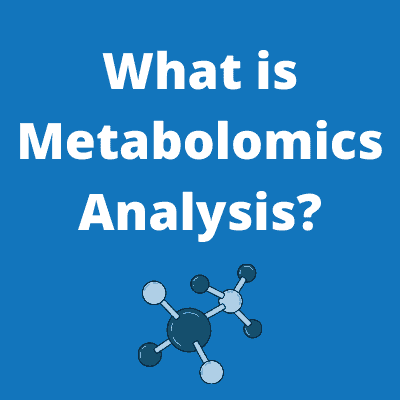Metabolomics Analysis – An Overview
- 8th March 2022
- Posted by: Breige McBride
- Category: Metabolomics

Whether you want to learn about metabolomics analysis in general; or you want to outsource metabolomics data analysis, you are in the right place. You can request metabolomics analysis on our metabolomic analysis service page, or read on for our metabolomics analysis overview.
What does ‘metabolomics’ refer to?
Metabolomics refers to the study of metabolites which are present within a cell, tissue, biofluid or organism. ‘Metabolites’ is a term commonly used to refer to small molecules. However, metabolites are any substances which an organism uses or creates when breaking down food, chemicals, drugs or tissue. This happens via the metabolism process which gives an organism its energy.
Why is metabolomics important?
Metabolomics is important because it enables us to learn about cell processes. We can use the insights into cell processes to learn about diseases and how they work on a molecular level. Therefore, metabolomics is important to medical research. In fact, metabolomics analysis can help researchers to develop new drugs and therapies for diseases.
Who uses metabolomics?
As indicated above, medical researchers working in the field of drug development use metabolomics. However, we can use metabolomics data in a variety of ways. For example, since an organism’s metabolites are closely linked with its phenotype (observable traits such as height and eye-colour) metabolomics can help with the phenotyping of genetically modified plants. Other applications of metabolomics are in the fields of personalised medicine, toxicology, nutrigenomics and agriculture; to name a few.
Metabolomics measurement
The chemical properties of metabolites can be widely different, from hydrophobic macromolecules such as lipids (lipidomics) to smaller water-soluble metabolites such as sugars. Due to these differences, it is not generally possible to capture all metabolites by a single analytical method and several approaches are commonly used in combination.
These analytical approaches include Gas Chromatography and Liquid Chromatography, coupled with Mass Spectrometry (GC-MS and LC-MS respectively). Also, for high-throughput metabolomics studies 1D-NMR is a commonly used method.
What is metabolomics analysis?
Metabolomics analysis identifies and quantifies all of the metabolites in a cellular system. Analysts use a variety of analytic techniques to interpret metabolomics data such as pathway mapping, heat maps and cluster analysis. However, analysts need specialist knowledge to properly extract and interpret metabolomics data to gain biologically relevant insights. This is where bioinformatics providers like Fios Genomics can help.
Metabolomics analysis from Fios Genomics
At Fios Genomics we provide metabolomics data analysis for a variety of applications, including:
- To understand changes in metabolites and metabolic pathways over time
- For profiling of metabolites in biofluids between normal and diseased subjects
- To identify metabolites and derivatives associated with drug exposure and toxicity
We offer rapid turnaround analysis services for metabolomics data from a range of platforms including tandem GC-MS, LC-MS and NMR. What’s more, our bioinformaticians have strong backgrounds in biology which enable them to identify the biologically relevant insights in your metabolomics data; to help you reach your research goals. If you have a metabolomics project you would like to discuss please contact us.
Alternatively, if you would like to learn more about our analysis services, visit our metabolomics data analysis page.
What does a metabolomics data analysis report look like?
See for yourself! Contact us now to request our sample metabolomics data analysis report.
Author: Breige McBride, Content and Social Media Manager, Fios Genomics
Reviewed by Fios Genomics Bioinformatics Experts to ensure accuracy
See also:
Single-Cell Analysis – An Overview
Supporting Biomarker Discovery with Bioinformatics
Leave a Reply
You must be logged in to post a comment.

